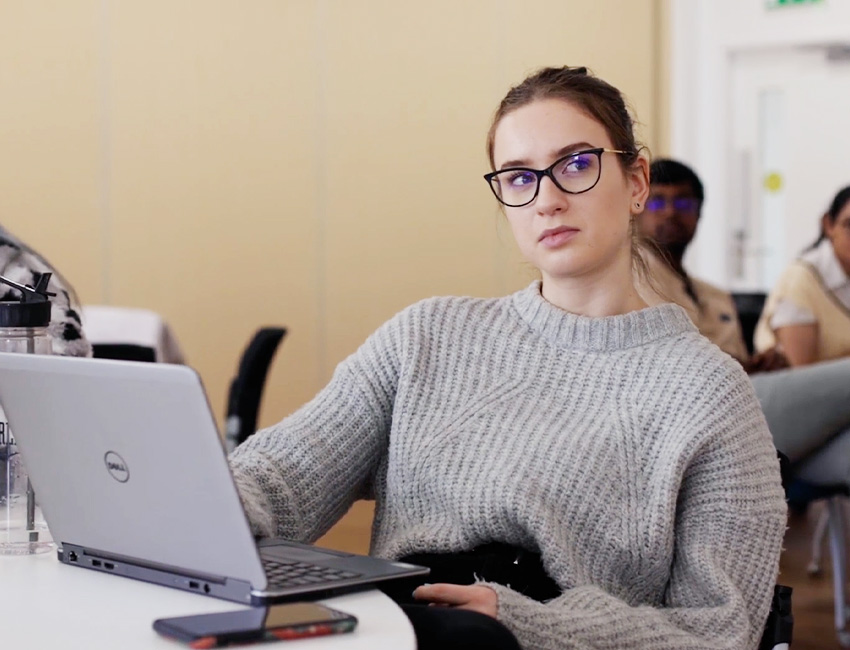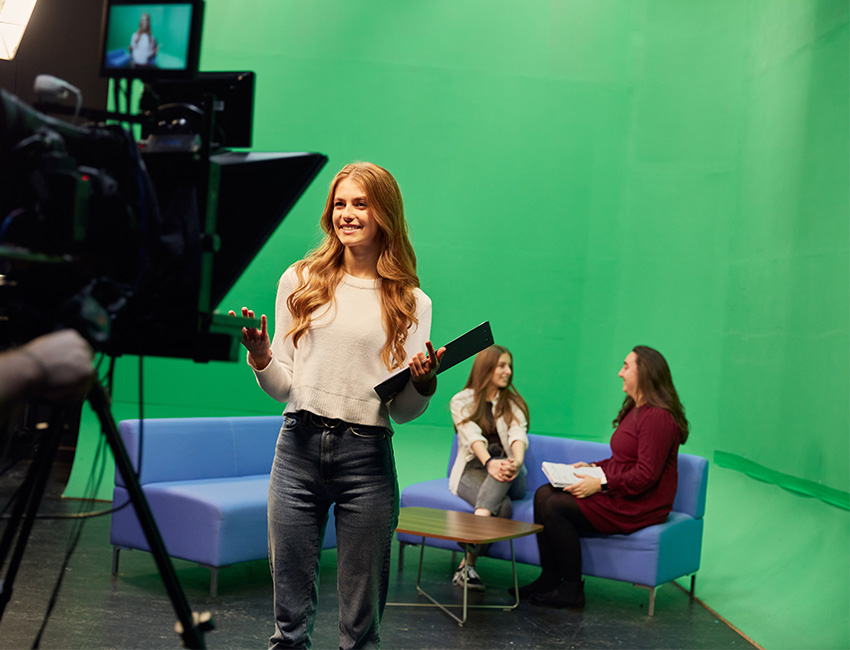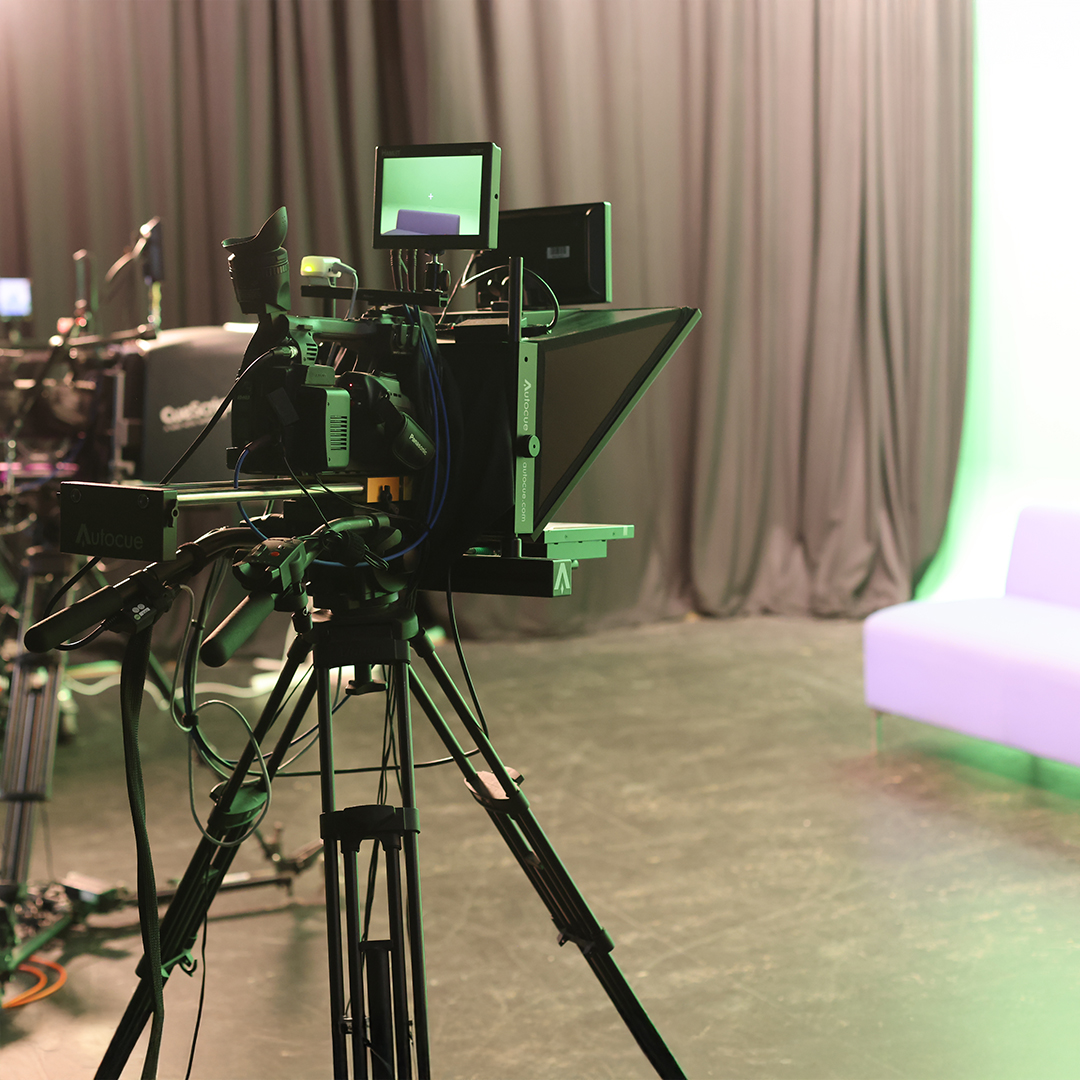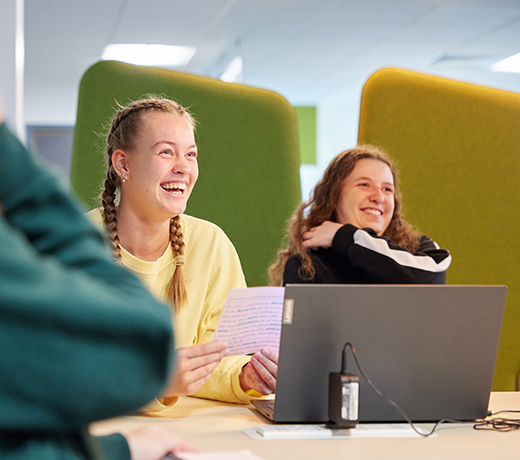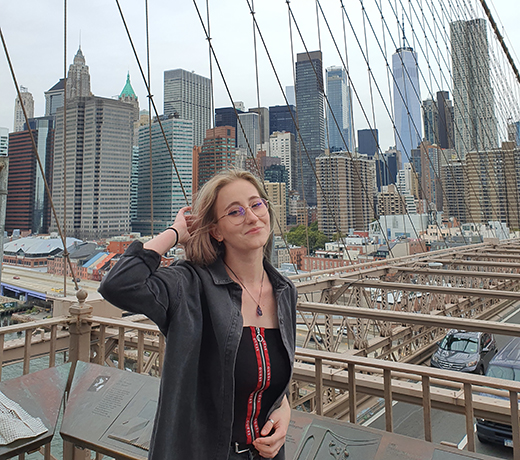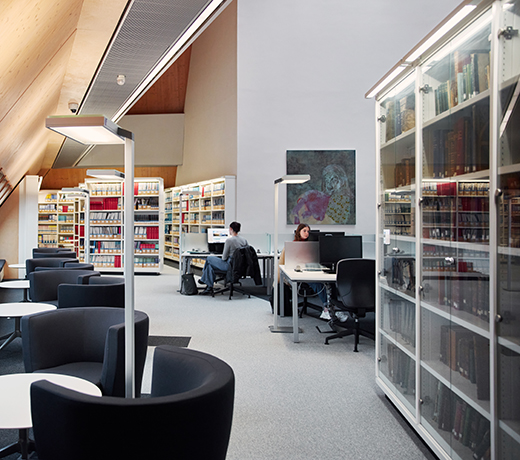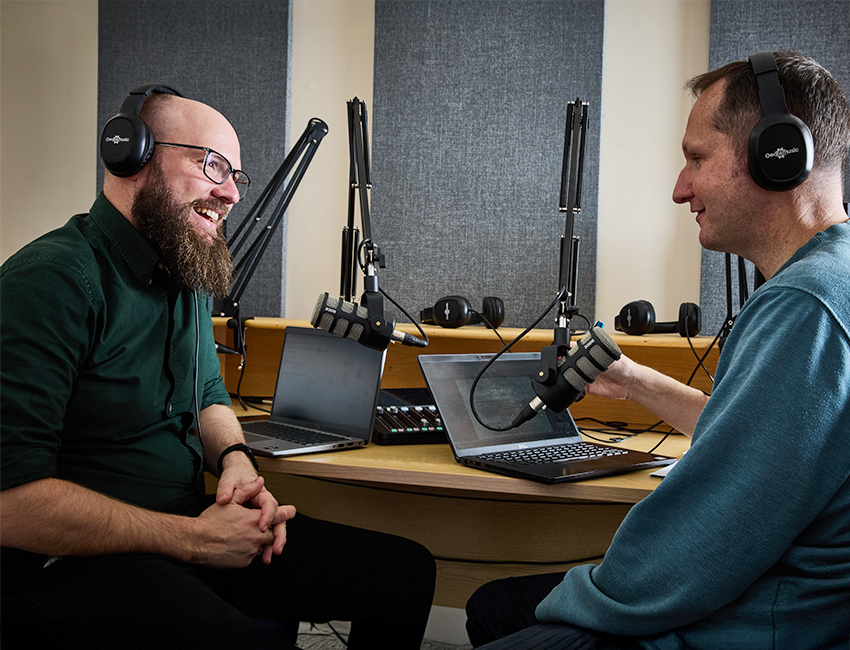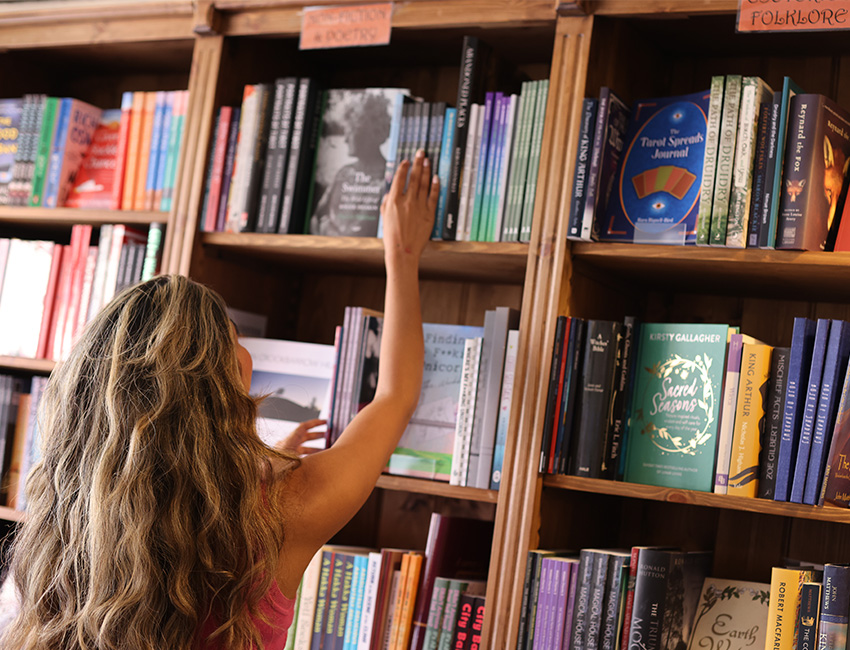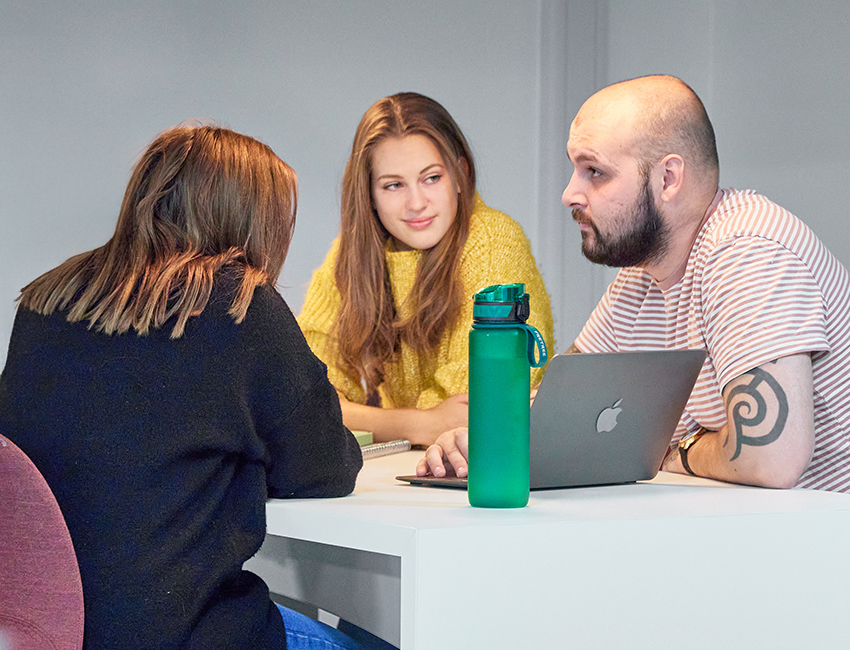From work placements to awards for outstanding literary research and journalism, this course offers hands-on experience and networking opportunities to help you stand out in a competitive industry.
of journalism students said teaching staff supported their learning well
of literature students said that the library resources supported their learning well
University of the Year finalist
Recognised for our graduate success, we’re shortlisted for University of the Year in the Times Higher Education Awards 2025.
Overview
Whether your aim to broadcast stories, investigate issues or shape ideas through research, this degree helps you achieve those goals by blending creativity with practical experience. You’ll explore how language and literature shape identities and societies while developing the skills to craft compelling stories and produce content for today’s media landscape.
From day one, you’ll gain hands-on experience in our radio, podcast and TV studios using industry-standard equipment. You’ll also benefit from the guidance of professionals with backgrounds in news, magazines, broadcasting, PR and digital media.
You’ll learn to spot, write and pitch stories, alongside gaining essential knowledge of media law, ethics and journalism’s role in society. As you progress, you can specialise in areas of journalism that inspire you, such as sport, music, fashion, investigative reporting, or campaigning on issues like gender, identity and the environment. Literature modules often explore similar themes, deepening your understanding of how stories reflect and challenge society.
Alongside developing your journalism skills, you’ll explore English Literature to understand its cultural and historical impact. You’ll study a wide range of texts, from classics to contemporary works, through close reading and discussion, connecting them to their contexts and key ideas. This combined approach shows how narratives, whether in literature or journalism, shape perspectives and drive change.
We have strong connections within the industry, giving students access to opportunities with organisations such as the BBC, through our Media Diversity Partnership, as well as a range of local media outlets. You’ll also have the chance to win awards, such as The Natasha’s Voice Prize for Original Broadcast Journalism or the Early Modern Research Prize for Literature, making your CV stand out in a competitive field.
Work experience
As you progress through the course, you’ll have plenty of opportunities to apply what you’ve learned in a professional context and prepare for your future career.
In your second year, you’ll have the option to explore career opportunities in your chosen field as part of an optional module. This includes creating a personal development plan, producing a CV and learning how to approach prospective employers.
You could take part in work placement opportunities with the BBC, through our BBC Media Diversity Partnership, as well as other broadcasters and local online and print organisations.
In your third year, you’ll have the chance to develop your professional skills further by completing a two-week journalism placement and refining your personal development plan to prepare for life after graduation.
Course content
Each year you will study a mix of mandatory and optional modules. Our diverse curriculum, taught by industry experts, will allow you to explore the core skills of journalism before you choose your final project in Year Three.
We regularly review our courses to reflect the latest research and developments in the subject area, as well as feedback from students, employers and the wider sector. As a result, modules may change to ensure the course remains current and relevant. Optional modules will run if enough students choose to study them. It is not guaranteed that all modules will be offered every year.
Careers
This joint honours degree is designed with your future in mind, equipping you with highly transferable skills such as writing, research, critical analysis, editing and public speaking, skills which are valued across a wide range of industries.
Throughout your studies, you’ll benefit from career-focused opportunities that prepare you for success. Work-related projects and placements will help you gain real-world experience and build a professional portfolio. You’ll also have the chance to earn awards that make your CV stand out in a competitive industry.
Our Careers and Employability Service offers tailored support to help you take confident steps toward your chosen career. From CV workshops and interview preparation to job search advice, you’ll have access to expert guidance throughout your degree.
An English Literature and Journalism degree broadens your career options by developing your ability to adapt tone, craft compelling narratives, and analyse language and texts in depth. These skills can lead to roles in:
- Media and broadcasting
- Publishing
- Copywriting
- Editorial assistant
- Content strategist
- Marketing
Opportunities to progress
You may wish to take your learning further and progress onto postgraduate study. Relevant postgraduate degrees at Worcester include:
Some former graduates have also chosen to complete a Law Conversion Course (commonly known as a PGDL or a GDL). This is a postgraduate qualification designed for non-law graduates looking to pursue a career in the legal field.
Course highlights
Teaching and assessment
Teaching is a mix of interactive seminars, lectures, and one-to-one tutorials. Our modules give you the chance to develop your skills through practical sessions and personal guidance.
Teaching and assessment contents
You’ll learn through a mix of lectures, seminars, workshops, and hands-on activities that bring theory and practice together. In Journalism, this includes newsdays, work simulations and production practice using industry-standard equipment in our TV and radio studios. You’ll also explore the social, political and ethical contexts of journalism while developing the skills to create content across multiple platforms. In English Literature, you’ll engage with a wide range of texts through close reading, discussion and interactive workshops, supported by film screenings and research trips to cultural locations. Digital tools and our virtual learning environment enhance your learning throughout.
Both subjects offer opportunities to build employability skills. Journalism students undertake work placements in their second and third years, while English Literature students complete a Work Project module in year two, gaining valuable professional experience. This combination of academic study and real-world practice ensures you graduate with the knowledge, creativity and confidence to succeed in a variety of careers.
Entry requirements
UCAS tariff points required: 104
| Qualification | Grade |
|---|---|
| A-level | BCC |
| BTEC National Extended Diploma | DMM |
| T-level | M |
We do accept Access to HE Diplomas and other qualifications which may not exactly match the combinations above. Work out your estimated points with the UCAS tariff calculator.
Any questions?
If you have any questions about entry requirements, please call our Admissions Office on 01905 855111 or email admissions@worc.ac.uk.
Fees
Fees contents
UK and EU students
In 2026/27 the standard fee for full-time home and EU undergraduate students on BA/BSc/LLB degrees and FdA/FdSc degrees is £9,790 per year.
Tuition fees are reviewed annually and may increase each year for both new and continuing students.
For more details on course fees, please visit our course fees page.
International students
In 2026/27 the standard tuition fee for full-time international students enrolling on BA/BSc/LLB degrees and FdA/FdSc degrees is £17,200 per year.
Tuition fees are reviewed annually and may increase each year for both new and continuing students.
For more details on course fees, please visit our course fees page.
How to apply
How to apply contents
Applying through UCAS
UCAS is the central organisation through which applications are processed for full-time undergraduate courses in the UK.
Read our how to apply pages for more information on the application process, or if you’d like to apply for part-time study.
English Literature and Journalism BA (Hons) - QP35
Contact
If you have any questions, please get in touch. We're here to help you every step of the way.
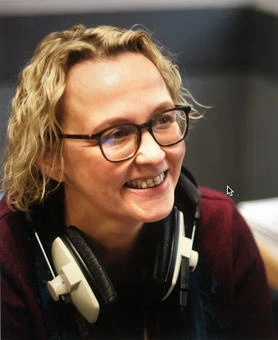
Admissions Office
admissions@worc.ac.uk01905 855111More to explore
Open Days
Visiting us is the best way to get a feel for student life at the University of Worcester.

The City of Worcester
Worcester is a welcoming university city with great transport links and plenty of student parking.

Accommodation
Benefit from our accommodation guarantee. We have rooms on campus to suit every budget including en-suite options.

